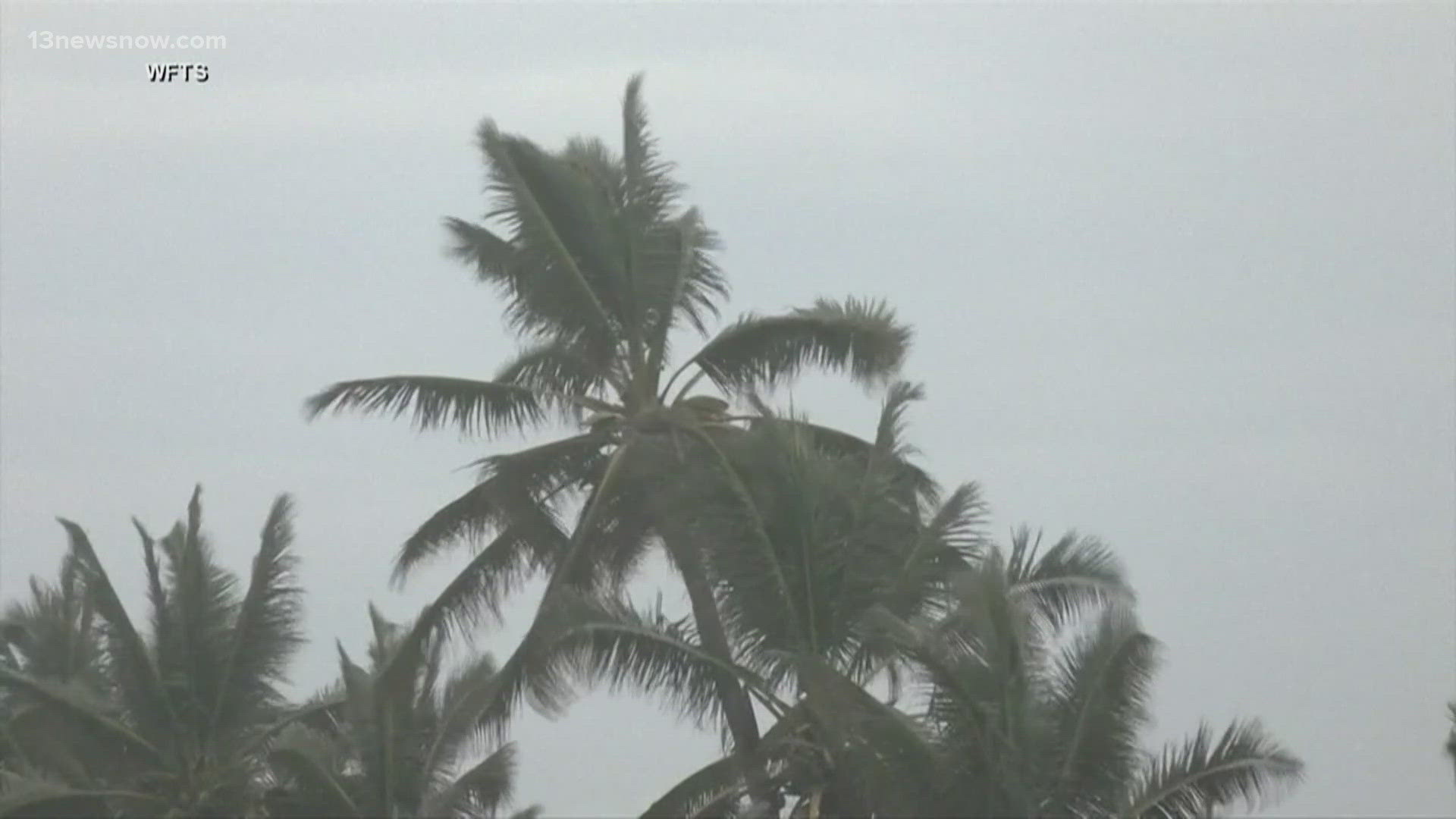NORFOLK, Va. — June 1 marks the official start of the Atlantic Hurricane Season, and forecasters are predicting 2024 could be an extremely active season. The National Oceanic and Atmospheric Administration (NOAA) says there’s an 85% chance it will be above average in storm activity.
An average Atlantic hurricane season produces 14 named storms, seven of which become hurricanes and three major hurricanes. About 20 other groups — universities, other governments, private weather companies — also have made seasonal forecasts and all but two foresee a busier, nastier summer and fall for hurricanes.
Here's what you can do now, ahead of the storm.
Put together a hurricane kit now
Virginia Governor Glenn Youngkin is urging Virginians to prepare now for the 2024 hurricane season.
"Virginians from every area of the Commonwealth need to be prepared and I’m asking Virginians to have a plan, sign up for emergency alerts, and know your evacuation route," Youngkin said. "Now is the time to prepare your families and property, check your insurance coverage, and identify those trusted sources of information that can help keep you safe."
Preparedness plans, emergency supply kits, and communication strategies should be in place at the start of hurricane season.
For a supply kit, you'll want to have enough non-perishable food, medicines, and water to last each person in your family for at least one week. Don't forget cash — ATMs won't work if the power goes out — and be sure to have batteries for cell phones, radios, and other devices.
Download the 13News Now Hurricane Guide for a complete list of resources to help you prepare for hurricane season.
Keep your insurance up to date
Governor Youngkin recommends you check your insurance coverage. Remember, there may be a waiting period (typically 30 days) for a flood insurance policy to become effective and be aware that not all storm-related losses, such as flooding, are covered under traditional policies.
Now is the time to review your coverage and contact your insurance agent for any changes. If you are not insured against floods, talk to your insurance agent, shop private flood insurance, or visit floodsmart.gov.
If you are a renter, now is the time to ensure you have adequate coverage to protect your belongings. Make sure you have adequate coverage on all insurance policies to ensure they reflect current home values and replacement costs.
Also, be sure to take pictures before the storm! It'll be a big help for insurance purposes, in case you have to make a claim because of damage. All you need is your cell phone. The best thing to do is to walk through each room slowly, narrating what the camera is looking at, and take a visual inventory of things covered by your insurance policy. Make sure to send that video to someone or upload it to the cloud, so you have it when you need it.
Know Your Zone
Evacuation along coastal areas may become necessary, depending on the track and severity of the storm.
Coastal Virginia is divided into four zones designated A through D. In the event of a hurricane, residents in certain zones may be directed to evacuate, while others could be asked to shelter in place. Virginia says the plan will reduce traffic, promote highway safety, and lessen overcrowding at storm shelters.
Virginia’s evacuation zones can be found at KnowYourZoneVA.org. Users can enter their physical address in the search bar of the website to view and confirm their designated evacuation zone. You can also call 211 or contact your local emergency manager to find out your zone.
Preparing for outages
Dominion Energy has worked to minimize outages caused by strong winds with its Strategic Underground Program.
Recently, Dominion finished burying 2,000 miles of overhead power lines underground. The program focuses on burying power lines in vulnerable areas.
Also remember, if your power is out or if you see downed lines, you should report it to your power company. You can call Dominion Energy at 1-866-DOM-HELP (366-4357) to report outages or report them online here. You can also get alerts on your cell phone by texting "DOM" to 898-366.
Natural Gas Safety
Virginia Natural Gas (VNG) offers these key safety guidelines for its customers to be aware of, in case a storm causes issues:
Meter Safety:
- DO NOT turn off your gas supply at the main meter. Only VNG or emergency personnel should do so.
- Keeping meters on helps maintain proper pressure and prevents water from entering fuel lines during flooding.
- Ensure your meter is visible and free of debris. Report any damage to VNG's 24-hour emergency line at 1-877-572-3342 or 911.
Appliance Safety:
- Leave natural gas equipment operational during storms. Most modern gas appliances have safety valves that shut off automatically.
- If uncomfortable, contact a certified professional to shut off and later restore your appliances safely.
- Do not operate appliances that have been under water until inspected by a professional.
Damage Prevention:
- Contact VA811 before removing downed trees to avoid damaging natural gas lines.
- Report any damaged meters or exposed gas lines immediately.
Detecting Gas Leaks:
- If you smell the “rotten-egg” odor of natural gas, leave the area immediately and call 911 and 1-877-572-3342.
- Avoid actions that could cause sparks, such as using cell phones or light switches.
Generator Safety:
- Use generators outdoors in well-ventilated areas. Avoid backfeeding by plugging appliances directly into the generator.
- Consult VNG before purchasing a natural gas generator to ensure your service line and meter can handle the required gas load.

